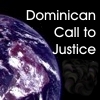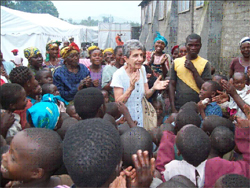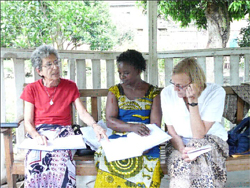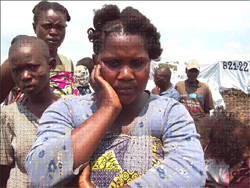 |
Maryknoll
in the Congo
On arrival in the Democratic Republic of the Congo, we met with church leaders, representatives of relief and human rights organizations, UN officials, governmental agencies and mining workers. The CPT team is an ecumenical group of peacemakers: Jane is a Quaker from Canada. Wendy, a development worker from Chicago, is a Mennonite. Cliff, an organic farmer from Indiana, is with the Church of the Brethren. When Wendy left after one month, Andrea, a Mennonite who does immigration work in Canada also joined the team for the remaining two months. I was the fourth member of the team.
Young boys are taken from their homes or from schools for training for the battlefield. Young girls are often taken for wives of the militia groups. My neighbor had 11 children and she hardly slept at night as she always feared that one of her children might be taken. In fact, one evening, her home was surrounded by militia and they took 4 of her children with them. She, her husband and remaining children and neighbors all ran after the kidnappers and were able to rescue the 4 children. However, sleep is difficult for her now, worrying that it will happen again. When we visited the Internally Displaced People's camps, we heard the stories of these refugees. Women told stories of husbands being killed as they were running. One woman told that she had to leave 3 different camps before she reluctantly came to this camp as she was still searching for her missing two children 6 and 8 years old who had been lost as she ran. Another woman told of going for firewood in the camp and being taken and raped by rebels who entered the camp from the forest. Indeed these were the crucified people Sobrino spoke of in Georgia at the SOA. Being a Maryknoll Sister on the team was especially gifting for me. I have already spent years in Kenya and Tanzania and so I was excited to be returning to Africa. I also knew the local language of the people, Swahili. That helped the team on many occasions, but it was especially helpful to me in meeting people. The language of the government is French, and one member of the team, from Canada, knew French, so we managed well. After three months in Congo, the team wrote our evaluation and
proposed a return to Congo. We have been invited by Synergie
(a group started by Justine Masika after she herself was abused)
to help women who have been raped, by Groupe Martin Luther King
to accompany people in the situation through non-violent action,
and by World Relief to help with the mobilization of post war communities. |
The Congo, a nation
state the size of western Europe has a great number of mineral resources:
coltan, cassiterite, wolframite, cobalt, diamonds, gold. This has clearly been the motivation for greed among business people around the globe. |


 CONGO-
April 3, 2009 -- In December
2008, Maryknoll Sister Rosemarie Milazzo joined three other
members of the Christian Peacemaking Team (CPT) for three months
of nonviolent peacmaking work in the Democratic Republic of the
Congo. Here is her report.
CONGO-
April 3, 2009 -- In December
2008, Maryknoll Sister Rosemarie Milazzo joined three other
members of the Christian Peacemaking Team (CPT) for three months
of nonviolent peacmaking work in the Democratic Republic of the
Congo. Here is her report. We
went to the town of Goma in the eastern part of the Congo. From
there we reached out to outlying areas and neighborhoods to see
how our presence could help. CPT met with many local NGO’s
working for peace. We held seminars with the Quaker Peace Movement,
worked in villages with parish groups, and met with UN officials.
With all of these, we shared our non-violent way of peacemaking
through direct action. Goma is a town surrounded by a volcanic
mountain and many hills. There is rain to produce enough food for
all if there wasn’t war. People could not get to their fields
because of the danger. Otherwise, Goma has been called the bread
basket of Congo.
We
went to the town of Goma in the eastern part of the Congo. From
there we reached out to outlying areas and neighborhoods to see
how our presence could help. CPT met with many local NGO’s
working for peace. We held seminars with the Quaker Peace Movement,
worked in villages with parish groups, and met with UN officials.
With all of these, we shared our non-violent way of peacemaking
through direct action. Goma is a town surrounded by a volcanic
mountain and many hills. There is rain to produce enough food for
all if there wasn’t war. People could not get to their fields
because of the danger. Otherwise, Goma has been called the bread
basket of Congo. At the SOA Watch last Fall, Jon Sobrino spoke of the crucified
people of the world today. My sense in Goma was that I was
among these crucified people. One of my neighbors, a university
student, was shot to death one evening as he studied for the next
day's classes. I learned that he was the fourth university
student this year to be killed.
At the SOA Watch last Fall, Jon Sobrino spoke of the crucified
people of the world today. My sense in Goma was that I was
among these crucified people. One of my neighbors, a university
student, was shot to death one evening as he studied for the next
day's classes. I learned that he was the fourth university
student this year to be killed.